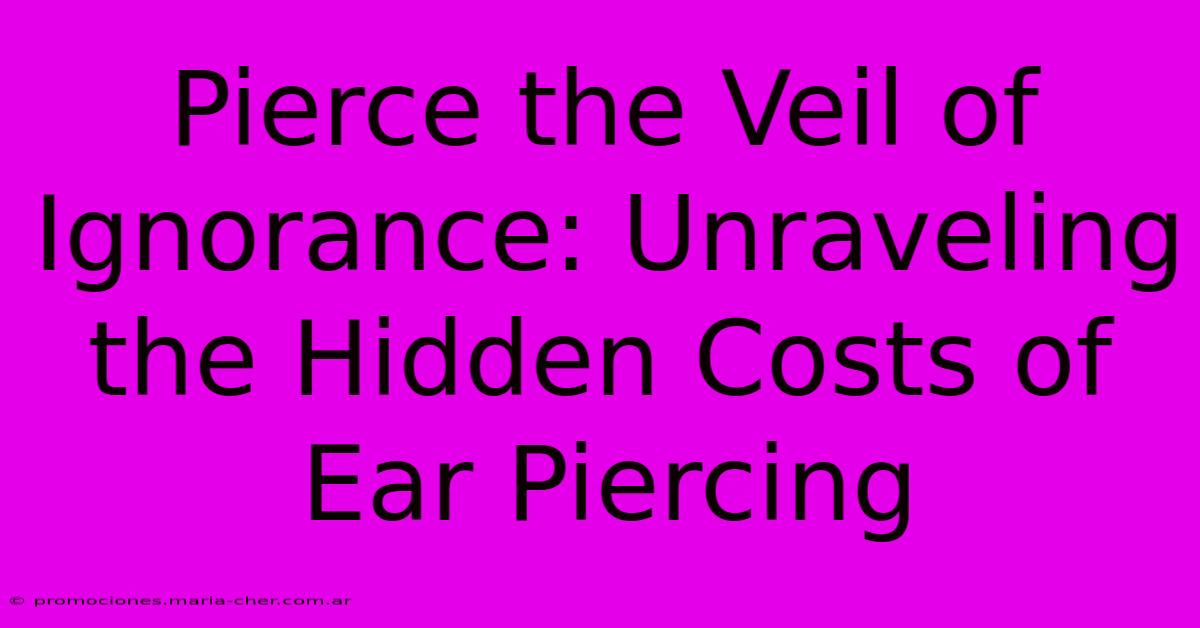Pierce The Veil Of Ignorance: Unraveling The Hidden Costs Of Ear Piercing

Table of Contents
Pierce the Veil of Ignorance: Unraveling the Hidden Costs of Ear Piercing
Ear piercing. A seemingly simple rite of passage, a small act of self-expression. But beyond the initial excitement and the tiny stud, lies a world of potential complications and hidden costs that many overlook. This article delves into the often-unacknowledged realities of ear piercing, urging you to consider the complete picture before taking the plunge.
Beyond the Initial Sting: Potential Risks and Complications
While ear piercing is generally safe when performed by a trained professional, it's crucial to be aware of the potential risks. These range from minor inconveniences to serious health concerns.
Infection: A Significant Concern
Infection is a major risk, especially if the piercing is performed unsanitarily. Symptoms can include redness, swelling, pain, pus, and fever. Ignoring an infection can lead to more serious problems, potentially requiring medical intervention including antibiotics or even surgical drainage. Proper aftercare is paramount in preventing infection.
Allergic Reactions: More Than Just Irritation
Not everyone's ears react the same way to piercings. Allergic reactions to the metal used (nickel is a common culprit) can cause significant discomfort, itching, redness, and even skin lesions. Choosing hypoallergenic materials like surgical steel or titanium is crucial for minimizing this risk.
Keloids and Hypertrophic Scars: Unsightly Aftermath
For some individuals, ear piercing can lead to the formation of keloids or hypertrophic scars – raised areas of scar tissue that extend beyond the original wound. These can be unsightly and, in some cases, require medical intervention to reduce their size and appearance. Genetic predisposition plays a significant role in keloid formation.
Other Potential Complications: A Comprehensive Overview
Beyond infection, allergies, and scarring, other potential complications include:
- Bleeding: Minor bleeding is common, but excessive bleeding warrants immediate medical attention.
- Nerve damage: In rare cases, piercing can damage nerves, leading to temporary or permanent numbness.
- Pain and discomfort: While temporary, pain and discomfort are common during the healing process.
- Migration or rejection: The body may reject the piercing, causing it to migrate or fall out.
The Financial Fallout: More Than Just the Initial Cost
The initial cost of ear piercing is just the tip of the iceberg. Consider these additional financial implications:
Aftercare Products and Supplies: A Necessary Investment
Proper aftercare is essential for preventing infection and complications. This necessitates investing in antiseptic solutions, saline spray, and other aftercare products. Neglecting aftercare can lead to far greater expenses down the line.
Medical Treatment: The High Cost of Complications
If complications arise, such as infection or allergic reactions, medical treatment can be costly. Doctor's visits, medication, and potentially even surgery can significantly add to the overall expense. Prevention is always cheaper than cure.
Replacing Lost or Damaged Jewelry: An Ongoing Expense
Pierced ears require ongoing maintenance. Lost or damaged jewelry needs replacing, adding to the ongoing costs associated with maintaining your ear piercing.
Making Informed Decisions: Weighing the Risks and Rewards
Before deciding to get your ears pierced, carefully weigh the potential risks and costs against the aesthetic benefits. Thoroughly research reputable piercers with impeccable hygiene practices and consider the long-term commitment involved in caring for a piercing. Informed decisions lead to better outcomes.
Choosing a Reputable Piercer: The Foundation of Safe Piercing
Selecting a licensed and experienced piercer is critical. Look for a professional who utilizes sterile equipment, follows proper hygiene procedures, and provides clear aftercare instructions. Don't compromise on hygiene – your health is at stake.
Aftercare: A Crucial Step Towards Successful Healing
Diligent aftercare is essential for preventing complications and ensuring proper healing. Follow your piercer's instructions carefully and don't hesitate to seek medical advice if you experience any problems.
By carefully considering the hidden costs and potential risks associated with ear piercing, you can make an informed decision and minimize the chances of encountering problems. The allure of a new piercing should never overshadow the importance of safety and responsible self-care.

Thank you for visiting our website wich cover about Pierce The Veil Of Ignorance: Unraveling The Hidden Costs Of Ear Piercing. We hope the information provided has been useful to you. Feel free to contact us if you have any questions or need further assistance. See you next time and dont miss to bookmark.
Featured Posts
-
Say Goodbye To Clutter Corner Living Room Ideas For A Tidy And Inviting Home
Feb 11, 2025
-
Discover The Truth A5 Vs A4 Unraveling The Superior Smartphone
Feb 11, 2025
-
Marq Log In Elite Elevate Your Smart Home Experience Today
Feb 11, 2025
-
Unlock The Convenience Of Home Management Perry Homes My Account Made Easy
Feb 11, 2025
-
Discover The Hidden Gem Perry Homes In Santa Rita Ranch 50 Your Oasis Awaits
Feb 11, 2025
